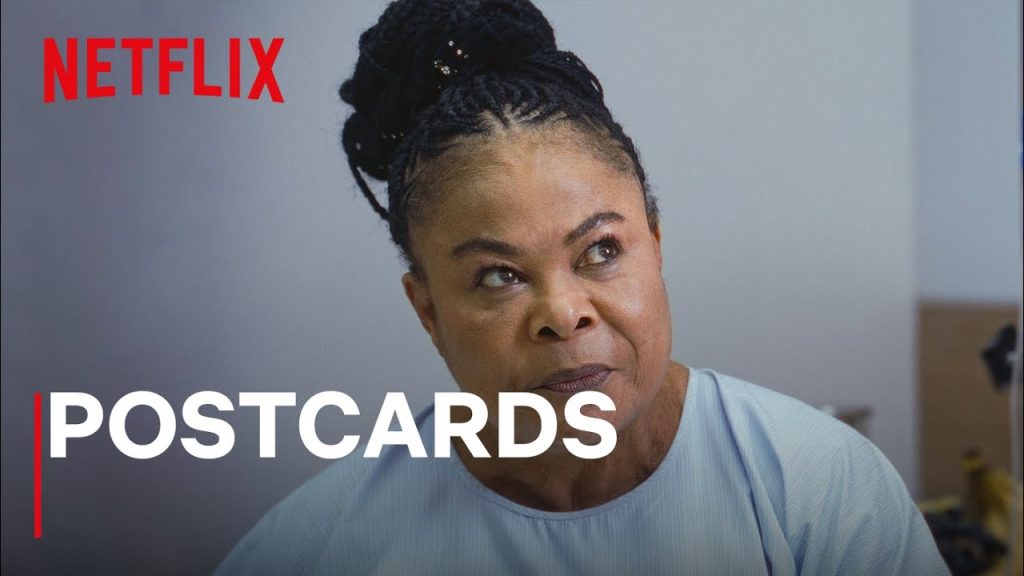Movie Title: Postcards
Date Release: 3 May 2024
Streaming platform: Netflix
Episodes: 6 Episodes
Running time: 32 minutes per episode
Director: Hamisha Ahuja
Cast: Sola Sobowale, Richard Mofe-Damijo, Rahamu Sadau, Nancy Iseme, Rio Kapadia, Rajneesh Duggal.
Indeed, Nigeria and India share profound similarities stemming from shared colonial histories, vast populations, and rich heterogeneous cultural heritages.
One notable similarity is the prominence of their respective film industries, Nollywood and Bollywood, which rank among the largest in the world.
Building upon these shared traits, collaborations between Nigeria’s and India’s film industries have become increasingly common, with projects like Namaste Wahala and, most recently, “Postcards” exemplifying this trend.
By bridging the gap between Nigeria and India through storytelling, the film showcases the beauty of diversity and highlights the universal themes that unite us all.
“Postcards,” a Netflix series created by Indian filmmaker Hamisha Ahuja, following the success of her 2021 film “Namaste Wahala.”
Ahuja’s work explores the rich cultural intersections between Nigeria and India, building upon the foundation laid by her previous cross-cultural venture.
Drawing inspiration from the romantic comedy genre synonymous with Nollywood filmmaking, “Postcards” navigates themes of love, marriage, and societal expectations with a fresh perspective.
However, despite the lofty expectations this movie sets for itself, Postcards struggles to reach its bar, as several subplots still need to be solved.
The series tells us the story of Aunty Olubunmi, who decided to live fully after losing her husband twenty years ago.
Living to her new resolutions, she’s now the mover and shaker of all the big parties in Lagos. With all its gilts and glamour, Aunty Olubunmi never misses out on any party.
But despite being the life of the party, she returns home, lonely and alone, to face the harsh reality of her life: her failing health and her distant son, who never reaches out to her.
Dangote adbanner 728x90_2 (1)
Aunty Bunmi’s son, Oluyemi, struggles with the hardship of surviving in Nigeria as a dancer. With no goals and aspirations aside from dancing, Yemi anticipates leaving Nigeria someday. Well, luck came on his side, and an Indian agency selected him as a backup dancer for one of their projects.
Meanwhile, Aunty Bunmi’s brother Olumide has already settled in India for a long time. He is an established businessman without time for family, socialisation, or frivolities. If it is not business, he is not interested. This makes him inapproachable, cold, and challenging to work with, and the only person who can stand him is his accountant, Kabir.
However, Olumide is shocked to find Rekha, the woman he once loved, living in a property they visit. Rekha refused to marry him due to family pressure.
In the meantime, Aunty Bunmi finds herself in the hospital for neglect of her health. She had always resorted to prayers, herbs and also orthodox medicine, but it didn’t seem to help her situation. Doctors recommend that she travel to India to meet specialists for her care.
Sola Sobowale
Sola Sobowale
Aunty Bunmi tries to contact her son Yemi, who is passionate about dance and wants to become a star, but all to no avail. Little did she know that Yemi was finding his way to Mumbai, India, for his dance career.
When Aunty Bunmi arrives in India for her medical check-up, she meets her doctor, Siddarth, who feels connected because his wife is also Nigerian. Siddarth and his wife, Zainab, were having some crises because they had earlier decided not to raise kids; Siddarth now has a change of mind, but persuading his wife to do the same seems not to be making headway.
While Yemi faces challenges as a backup dancer in a Bollywood movie, he is troubled by Ronny, one of the lead dancers, who bullies him because he’s different. Although his fellow dancer Aarti stands up for Yemi and helps him with choreography, their relationship seems steaming to love.
Meanwhile, when Aunty Bunmi was told her health crisis would require an operation, she initially did not welcome the idea of the operation. Still, when it was clear that the operation was inevitable, She tried to make peace with her brother, Olumide and continued with her efforts to reach out to Yemi.
Would Aunty Bunmi ever reunite with her son? Would Olumide ever find love again? What will become of Siddarth and his wife, Zainab? How will Yemi navigate his new career in India?
Character Analysis
The cast of “Postcards” boasts a diverse blend of seasoned veterans and emerging talents, each bringing their unique flair to the screen. The actors are from Nigeria and India.
They include popular Indian actor Rajneesh Duggal, who portrayed Siddarth. He has appeared in several Bollywood movies, including Mandali (2023) and Inspector Avinash (2023).
The movie also featured veteran Indian actor Rio Kapadia, best known for films such as ‘Dil Chahta Hai’ (2001), ‘Chak De! India’ (2007), and ‘Happy New Year’ (2014). However, he died in 2023 after battling cancer. He played the role of Kabir, Olumide’s accountant and friend.
Some Nigerian actors in the series include Sola Sobowale, Tobi Bakre, Richard Mofe-Damijo (RMD), Rahama Sadau and Nancy Isime.
The Nigerian actors in “Postcards” bring a dynamic energy to the series, enriching the narrative with their talent and charisma.
Sola Sobowale takes centre stage as Aunty Bunmi, anchoring the storyline with her powerful portrayal and commanding presence. She is a standout character in the series.
RMD brings his wealth of experience and expertise to his role, delivering a performance that adds depth and leaves a lasting impression on viewers as he plays the role of Olumide.
Rahama Sadau, playing the role of Zinab, shines with her captivating screen presence and impressive command of the Hindi language, infusing her character with authenticity and grace enhancing the cultural fusion at the series’ heart.
Nancy Isime played Isioma. Though a minor character, she impresses with her versatility and charm, effortlessly navigating between light-hearted moments and scenes.
Together, this talented ensemble cast elevates “Postcards,” weaving together rich performances that make the series a compelling watch for audiences seeking both entertainment and substance.
Movie Analysis
‘Postcards’ showcases a rich cross-cultural international collaboration, which speaks highly of the growth in the Nigerian film industry. However, the movie sets a height too far for it to reach.
The two significant recent attempts at Bollywood cum Nollywood collaboration, ‘Namaste Wahala’ and ‘Postcards’, have been two spectacular efforts at crossbreeding Nigerian and Indian values; it has not matched the anticipation and rave it comes with.
For ‘Namaste Wahala’, centred on an Indian Nigerian marriage and wedding, most of the shooting was done in Nigeria. However, Postcards is the direct reverse.
The movie Postcards addresses and narrates many situations and subplots linked to Aunty Bunmi. This becomes the movie’s biggest strength and, at the same time, its most muscular weakness.PostCards
The movie presents the reality of India and Nigeria, which, like every other country in the world, has its fancy estates and slums. Although much attention wasn’t given to India’s different environs, the characters show us some exciting things about the country.
Aunty Bunmi’s eyes show the luxurious and compassionate India, showcasing plush hotels and caring doctors. Meanwhile, Yemi encounters the deceptive and harsh side, dealing with deceitful brokers and workplace bullies. Despite this, “Postcards” portrays both aspects of India with empathy, offering a balanced perspective.
The series excels with its cinematography and good visual odyssey of India and Lagos, Nigeria. The star performances from the Nigeran and Indian cast were exceptional and delightful. It fusses Nigerian and Indian language elements in such an exciting blend, and the music and dance sequence were as intriguing as they were entertaining.
It also highlights its didactic lessons on family, love, marriage, friendship, and communication themes, which merge from both cultures.
But where the series flickers is in its story. There were so many unresolved subplots, so much so that the central idea of the series, at some point, went missing.
This is seen in the movie’s last scenes, with little or no justification at the end. Usually, the end justifies the means, but with Postcards, there is no means to justify the end.
There is no explanation for why Ronny was bullying Yemi, as there were not many explanations for why Olumide and Rekha never married. We can’t even tell if Rekha’s daughter was his. The same goes for the distance between Yemi and his mother and the reason behind Siddarth and his wife, Zainab’s decision not to bear a child.
There were no concrete explanations, and where there were explanations, they needed to be more robust and sufficient to juxtapose the character’s actions.
It feels like “Postcards” is pushing a regressive notion that marriage isn’t complete without children. Moreover, Zainab’s concerns about how pregnancy might affect her career are left unaddressed, as we’re given no insight into her profession or workplace.
Consequently, her arguments need to be more weight. When Zainab stumbles upon a text message from Kareena on Siddharth’s phone, insinuating infidelity, the issue is casually dismissed to steer the narrative towards a happier tone.
“Postcards” presents a tangled web of characters and storylines that often miss the mark.
Despite some moments of emotional resonance, the overall execution could be more engaging and cohesive.
Verdict:
6/10
(Premium Times)







